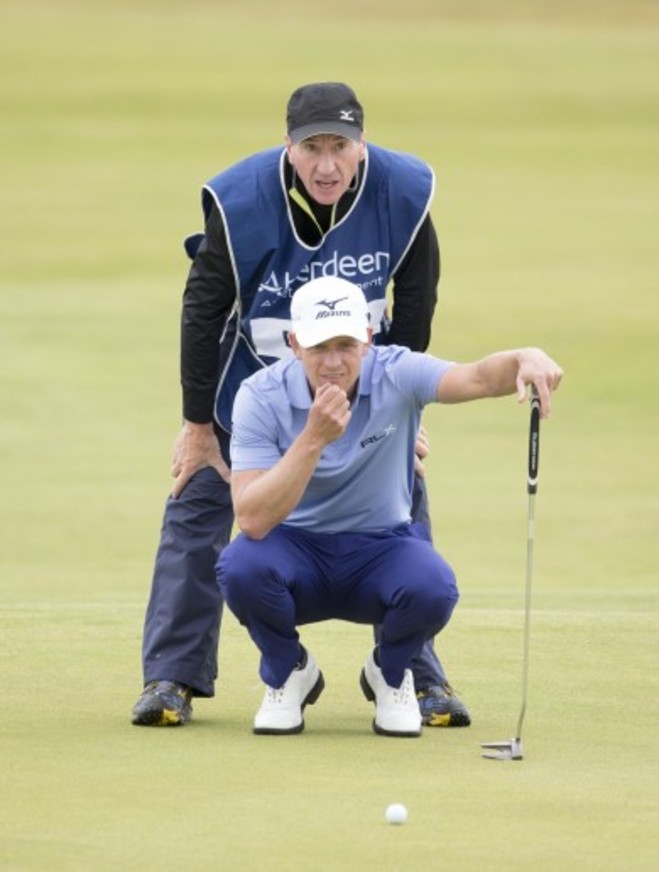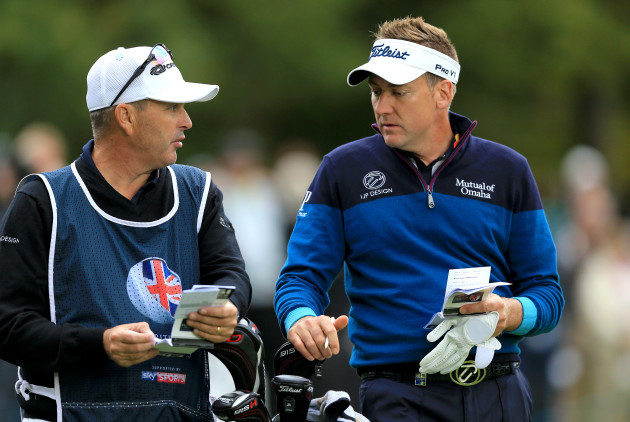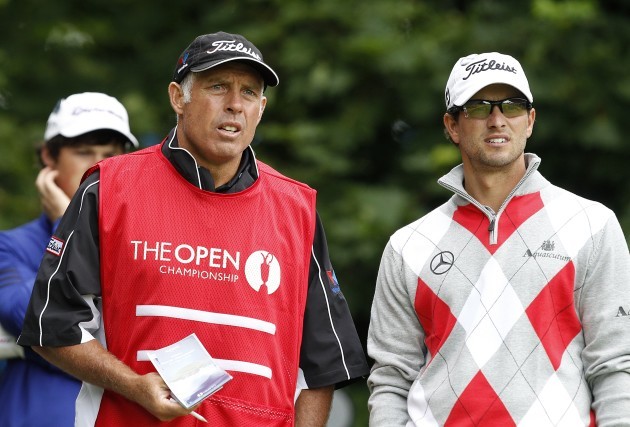IMAGINE SEEING A job advertisement for which there was no security, the contract would be finalised with a verbal agreement, you’ll go long periods of time without seeing family or friends, you’ll live out of a suitcase, stress is high and the chance of success is low.
Such is life for some professional Tour caddies.
At the PGA Catalunya in Girona last month, a clutch of these ‘bagmen’ made their way to the course a day before the opening round. Nothing new there.
They came from the US, Britain, Korea and Scandinavia.
They each booked a one-way ticket to Girona (because they didn’t know where they’d be the following week), picked up an economy class hire car at the airport, squeezed into an Airb&b apartment in the city (five into a two-bed)… and hoped.
Some have university degrees, others are tradesmen, one said he’s an entrepreneur.
His idea of entrepreneurship was loitering around the practice range and standing behind any of the 156 who would tee it up the following day. Every so often he’d approach after an arrow down the range and ask, ‘are you stuck for a caddy?’
This is the not-so-glamorous side of what it means to be a wannabe bagman.
One caddy – who preferred to remain nameless for the purposes of this article, arrived to the practice range with his player, both a little sunburnt from weeks spent travelling around the peninsula making it through the various qualifying stages, but glad to be here.
“I’m a golf nut,” he said. “It’s my passion, I play as often as I can and I watch it on TV all the time.
“So to be earning a living being involved in professional golf, with the best players in the world, on the most prestigious courses in the world certainly beats the norm of working 9-5 behind an office desk.
“I, like many other caddies, left that lifestyle for the one I’m living now.”
A day later, his cheery disposition of that Thursday morning was replaced by a look of worry as his player had slumped to a dreadful opening round, leaving him in danger of missing the cut.
When players perform poorly for sustained periods, the caddy is usually the first to go.
The caddy in question returned to his own rented apartment (a single room you couldn’t swing a putter in). He drank three beers of Estrella and cooked a cheese pizza in the oven while his player pondered his paltry challenge in a hotel around the corner.
The caddy went through every shot in detail that night.
Consquences
The difference between making it onto the European Tour – which is what all 156 players this week want, and being demoted to the Challenge Tour might only be a couple of dozen golf shots over the course of a season, but the financial repercussions are huge.
Prize money on the Challenge Tour is only a fraction of what’s on offer in the European Tour.
This year’s top moneymaker on the European Tour, Rory McIlroy, made €4.5 million; the top player on the Challenge Tour made €251,000.
Most of the latter events are not televised, and endorsement deals are nowhere near as big. If playing on the European Tour is like having your product on the windowsill of the biggest supermarket chain going, playing on the Challenge Tour is having it on the shelf of a local bodega.
Success breeds success, for player and caddy.
But if players earn very little, what about the caddies – and why do they do it?
“This is a difficult question to answer,” continues our caddy as he works his way through his pizza.
Having restricted himself to the free apples and bananas on the course all day because the buffet was too much at €18, he’s understandably famished.
The agent Chubby Chandler always said that Rory McIlroy’s bagman JP Fitzgerald might not be the best caddy in the world but, “he’s the best caddy in the world for Rory.”
“You have ‘good caddies’ that are with players that aren’t performing, so their income isn’t great and they are on the breadline,” caddy one continues.
“You also get guys earning in excessive of €300,000 a year.”
Learning what to say and when to say it can be as important as what club the caddy selects.
And with the rewards so huge – caddies will get a regular wage, eight per cent of the winnings and 10% of the winning pot, it’s a symbiotic relationship whereby rich player makes rich caddy.
This year, the caddy of world no.1 Jordan Spieth is estimated to have earned in excess of €1.8m so in that regard, if you work with a player on form, you can make a fortune, right?
“I guess that is largely what we are all in it for…along with the lifestyle of chasing the sun!
“The tough side of caddying is how cut-throat it is with regards job security,” interrupts another wannabe caddy.
“If a player has a bad couple of weeks, regardless of whether the caddy is to blame or not, quite often the caddy is sacked in an attempt by the player to change things up to improve their form.
“All ‘contracts’ are verbal so there is no six weeks’ notice period,” he adds. “If your time is up, it is up. Sadly, there are examples of this most weeks on tour.”
Luck is as important as knowledge or wisdom.
“Sure, there’s certainly an element of luck involved. Mostly, it’s a ‘right place right time’ kind of thing. You can be a great caddy but if your player doesn’t play well, your bank balance suffers.
“Conversely, if you manage to strike up a good working relationship with a player hitting form and getting results, then you can make a very good wage. Often it is more luck than judgement when building these relationships.”
The ‘luckiest’ of all known caddies is probably Kiwi Steve Williams who made over €10,000,000 carrying Tiger Woods’ bag between 1999 and 2011.
He later said he was treated “like a slave” in his book ‘Out of the Rough’ but caddy number three – who also wished to remain nameless said he’d gladly work this kind of slave labour if those rewards were the offer.
“It is not easy – but it’s not slavery,” said this experienced European Tour veteran. “The travelling can become tiresome and you have so many different time zones, you miss friends and family, you stay by yourself in hotel rooms and fatigue is another issue. You have to be there for every beck and call, but it is not slavery.
“The hardest part of caddying, for me, is the lows of when your player is not performing.
“Ultimately, it is out of your hands and with the lack of job security, stress levels can be high with worry about how safe your role is. With that being said, the highs are incredible and make the lows worth it. You have to accept it is part of the job.”
The caddy fraternity is a small one. Everyone knows everyone. They dig each other out – but never at their own expense.
“It is a very tough profession to break into and you need to be ruthless,” caddy number two explains. “Without knowing a player who is willing to give you a shot, it is difficult and highly risky (and expensive) to turn up and try and secure a bag.
“It is certainly a case of once you’re in, you’re in, though. It’s essentially a family. It can be demoralising and very stressful trying to get in and you do often question whether it will ever happen.
“But like most things in life, if you want it enough, you have to be persistent and eventually you will get your break.”
As well as knowing every course and it’s intricacies, caddies need to be mentors and coaches. They need to know when to intervene and when not to. A wrong word at the wrong time can terminally end a partnership.
“There’s no right or wrong way of going about being a successful caddy,” caddy number two says.
“Each player looks for something different; some want a guy that is literally just going to turn up and carry the clubs, whereas some want their caddy to advise them on every shot and manage them around the course.
“Most guys find themselves somewhere in the middle of those extremes. Generally, player and caddy must get along, on a personal level, or the relationship won’t last long!”


